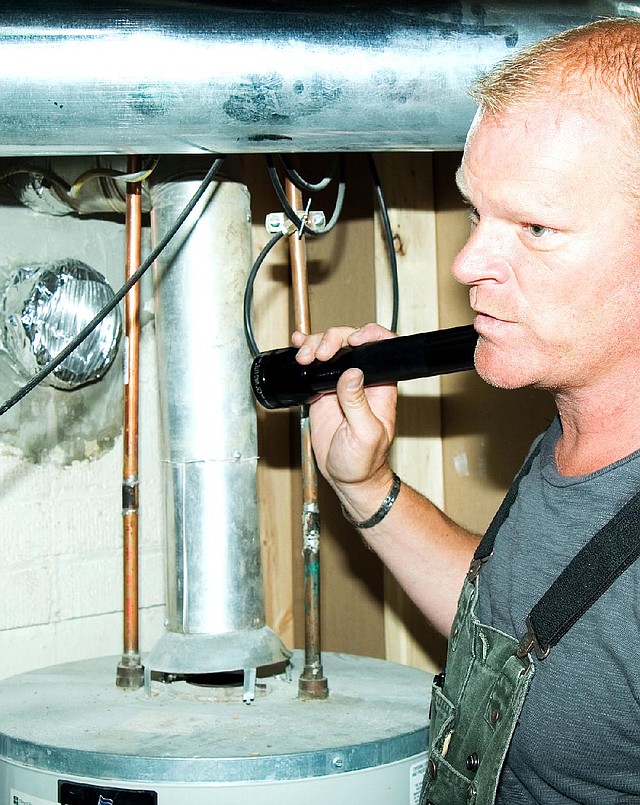House inspections costly yet priceless
AT HOME for release DECEMBER 2013 DESIGN SCHOOL Caption 02: Author and contractor Mike Holmes notes problems with the exhaust venting from a gas water heater, a critical problem that would be caught during a thorough home inspection.
Saturday, January 4, 2014
Most homeowners expect to spend money on their house, and not just for mortgage payments and insurance. They might want to add a backyard deck, remodel the kitchen, build an addition or tackle other projects to enhance the house and put their personal stamp on the design.
But what if all of those dollars had to go to repairs rather than improvements? It’s one thing to drop $20,000 and get a great new kitchen; it’s another to spend that same money replacing the furnace and HVAC system, eliminating dangerous old wiring or rescuing a crumbling foundation. Those kinds of big expenses are heartbreakers, devouring the fun money you’d hoped would pay for a new master suite or some other real improvements.
Every house purchase involves some unknowns and risks, but smart buying requires evaluating all of the major systems and components to ensure they are sound and compliant with code requirements. If you’re a typical homebuyer, you enlist the services of a professional house inspector for this task, but their expertise and competence vary widely. Ultimately, the homebuyer will live with the consequences of the decision, and that’s who needs some educating to spot a good house - and a good house inspector.
Canadian contractor Mike Holmes has lent his expertise to the HGTV network for the television series Holmes Inspection, and he has compiled much of that advice and information in a book of the same name.
The straight-talking, no-nonsense tone of the book is genuine Holmes, perfectly in keeping with his on-screen persona. This side of house building and remodeling is the gritty stuff, with big consequences for bad decisions and poor workmanship, and the author gives these weighty issues their due. A house inspection is often the key to making a decision about a fair price or even making an offer at all, and Holmes insists the process is a pathway filled with land mines for the unaware.Here are some caveats:
Inspectors have limits. They are not allowed to move personal property, can inspect only what is visible and accessible, and typically work under contracts that exempt them from evaluating many critical factors in a house’s condition. These factors can include air quality, fireplaces and wood stoves, the presence of toxic substances (such as mold, asbestos or lead paint), and many other important issues. An inspection is not a warranty that problems won’t develop or may exist and remain undetected, and financial damages from a misleading inspection report are often limited to the fee for the inspection service, even if the overlooked or undiagnosed problem costs thousands of dollars to remedy.
Conflicts of interest can undermine an honest review. Many house inspectors get work through Realtor referrals. An inspector that notes every defect is likely to derail some sales, and a real estate agent will soon look elsewhere to find an inspector with a “friendlier” approach. Inspectors know this, so they often tread carefully to avoid displeasing the agents who refer them, even though they are supposed to be serving the interests of the homebuyer. To counter this influence, Holmes advises would-be buyers to recruit their own inspector or insist on at least three referrals from a Realtor, and interview all of them.
Training, qualifications and regulations are inconsistent. House inspection is one of those problematic professions that requires well-trained and knowledgeable practitioners, but they aren’t subject to consistent training standards and oversight. There are certification and licensing standards in some states, but they vary widely, and the minimum requirements don’t ensure that an inspector is qualified. More surprising, Holmes says, is that many inspectors havelittle or no actual experience in the building trades. No one person can master all the details involved in a modern house, but any inspector should be able to answer specific questions about their training, credentials and the number of inspections they’ve done.
House “flipping” can mask problems. Rapid appreciation of real estate values tends to make speculators out of otherwise sensible people, and can turn investors and building contractors into “morally challenged” opportunists. There’s nothing wrong with house renovations and re-sales that turn a profit, but too often a quick-buck mentality is what drives the agenda, and the house will get merely cosmetic rather than genuine improvements. If you know or suspect that a house has gotten a quick renovation by an interim owner before being put back on the market, you and your inspector should be especially vigilant about spotting any shortcuts in the work.
Despite the potential setbacks in the process, finding a good house inspector isn’t a blind gamble. Not only does Holmes’ book inform readers about reliable methods for hiring a qualified inspector, it spends multiple chapters covering specifics about electrical systems, roofing and siding, heating and cooling systems, structural issues, and other aspects of house construction. Homebuyers who take the lessons seriously will know better where to look, what to look for, and if a professional inspector is really their ally.
The Holmes Inspection by Mike Holmes, Time Home Entertainment, 2012: $21.95, trade paperback 256 pages, available through retail and online booksellers.
HomeStyle, Pages 35 on 01/04/2014
